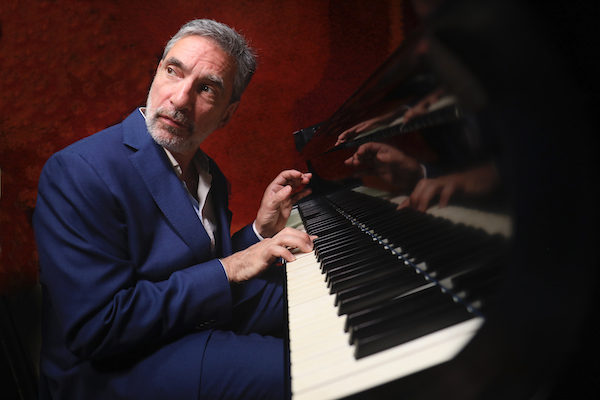Jan 13, 2026 2:09 PM
More Trump-Kennedy Center Cancellations
The fallout from the renaming of the John F. Kennedy Center for the Performing Arts to include President Donald…

Mike LeDonne returns to the piano trio format on Partners In Time.
(Photo: Chris Drukker)Listeners who know Mike LeDonne as a master Hammond B-3 practitioner through his Groover Quartet recordings on Savant might be surprised at the format of Partners In Time, his latest for the label. Joined by nonpareil swingers Christian McBride on bass and Lewis Nash on drums, the bandleader showcases his considerable prowess in the piano trio format.
Indeed, LeDonne primarily was identified as an acoustic pianist following his late-1970s graduation from New England Conservatory (where Jaki Byard was his mentor) and subsequent move to New York. He soon landed gigs with Benny Goodman and Panama Francis, then a sinecure as house pianist at Jimmy Ryan’s in Midtown, where Roy Eldridge held sway. As the 1980s morphed into the 1990s, LeDonne entered the regular rotation at New York’s then-numerous piano boîtes, and was a first-call sideman for Milt Jackson and Benny Golson.
During those years, LeDonne frequently shared bandstands with McBride and Nash, including a 1992 world tour in the Philip Morris Big Band. Their shared experiences permeate Partners In Time, an eight-tune, mostly one-take recital, engineered by Maureen Sickler at New Jersey’s Van Gelder Recording Studio.
“Mike studies language, and on both the piano and the organ he does a wonderful job of bringing out his personality from all that language,” McBride said. “We all speak it—it’s the language of the post-bop, hard-swinging church. So, doing the session was like putting on an old shoe.”
A few months before the March recording session, LeDonne played a date at Van Gelder studios with tenor saxophonist Eric Alexander, a frequent partner with Groover Quartet. On site, LeDonne asked to use the original piano that graced so many classics by his heroes during the 1950s and 1960s. Sickler readily agreed, and also replicated the two-microphone setup that Rudy Van Gelder used on those sessions. When LeDonne heard the playback, he decided to make his first piano trio date for Savant since 2005’s Night Song.
“Christian used to ask me, ‘When are we going to document our stuff?’” LeDonne recalled in his midtown Manhattan apartment. “I wrote him, ‘Let’s do it now.’ Then, it seemed obvious that I should get Lewis, too. We did what I’m used to doing with the Groover Quartet—having the music play itself, but sound arranged. Arranging too much kills the groove; it becomes too deliberate and in a box.”
Asked whether code-switching from one instrument to the other complicates sustaining chops and creativity, LeDonne responded, “No, because I’ve always played both.” He added that his father, a guitarist who owned a music store in Bridgeport, Connecticut, started him on piano at 5 and organ at 10.
“It’s two completely different headspaces,” he continued. “Once the instrument’s voice gets in your ear, it affects everything that comes out of your musical mind. On piano, you focus on controlling the sounds and notes with the muscles of your fingers; there’s a lot more fine motor stuff going on. On organ, it’s an explosion of the brain. All four limbs are going—you’re the bass player and the soloist, you keep the volume together, control all the drawbars, switch sounds, use the pedals.
“You won’t find many people who put out lots of records and played all over the world with masters as a pianist, and then, suddenly, did the same on organ. I didn’t plan it or think about it—it just happened. But looking back, I’d say that’s unique.” DB

Belá Fleck during an interview with Fredrika Whitfield on CNN.
Jan 13, 2026 2:09 PM
The fallout from the renaming of the John F. Kennedy Center for the Performing Arts to include President Donald…

Peplowski first came to prominence in legacy swing bands, including the final iteration of the Benny Goodman Orchestra, before beginning a solo career in the late 1980s.
Feb 3, 2026 12:10 AM
Ken Peplowski, a clarinetist and tenor saxophonist who straddled the worlds of traditional and modern jazz, died Feb. 2…

The success of Oregon’s first album, 1971’s Music Of Another Present Era, allowed Towner to establish a solo career.
Jan 19, 2026 5:02 PM
Ralph Towner, a guitarist and composer who blended multiple genres, including jazz — and throughout them all remained…

Rico’s Anti-Microbial Instrument Swab
Jan 19, 2026 2:48 PM
With this year’s NAMM Show right around the corner, we can look forward to plenty of new and innovative instruments…

Richie Beirach was particularly renowned for his approach to chromatic harmony, which he used to improvise reharmonizations of originals and standards.
Jan 27, 2026 11:19 AM
Richie Beirach, a pianist and composer who channeled a knowledge of modern classical music into his jazz practice,…